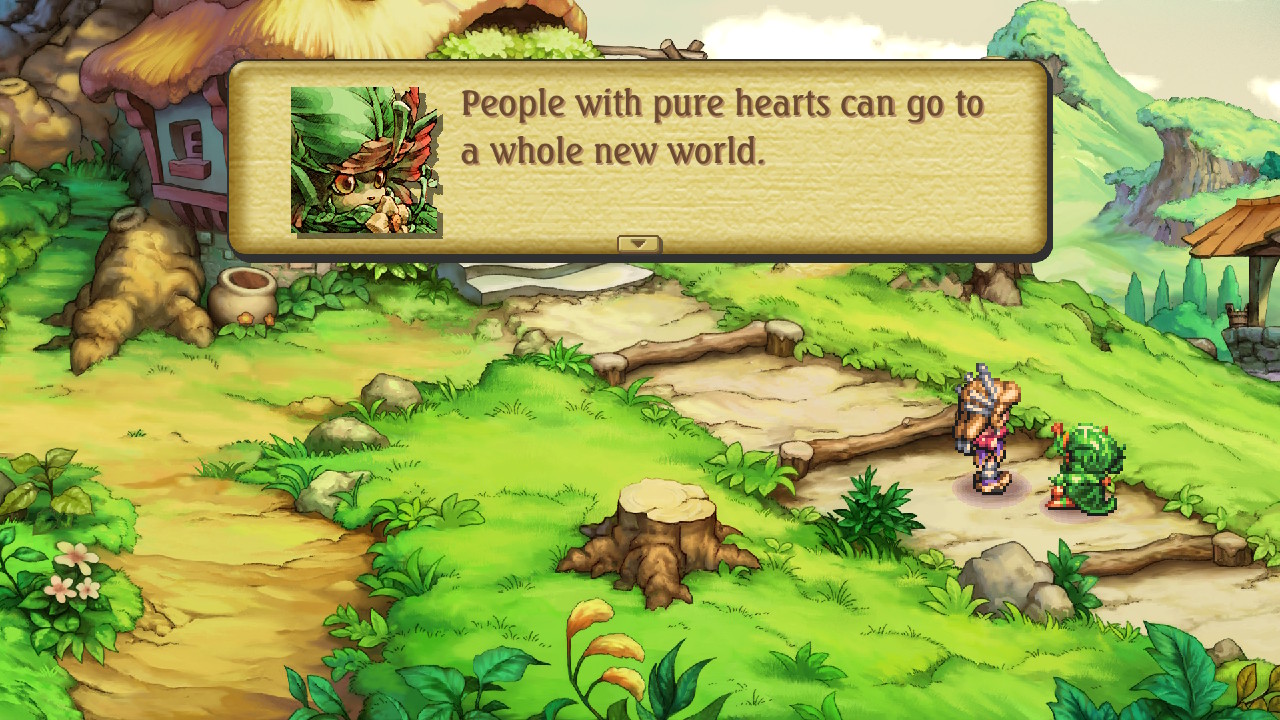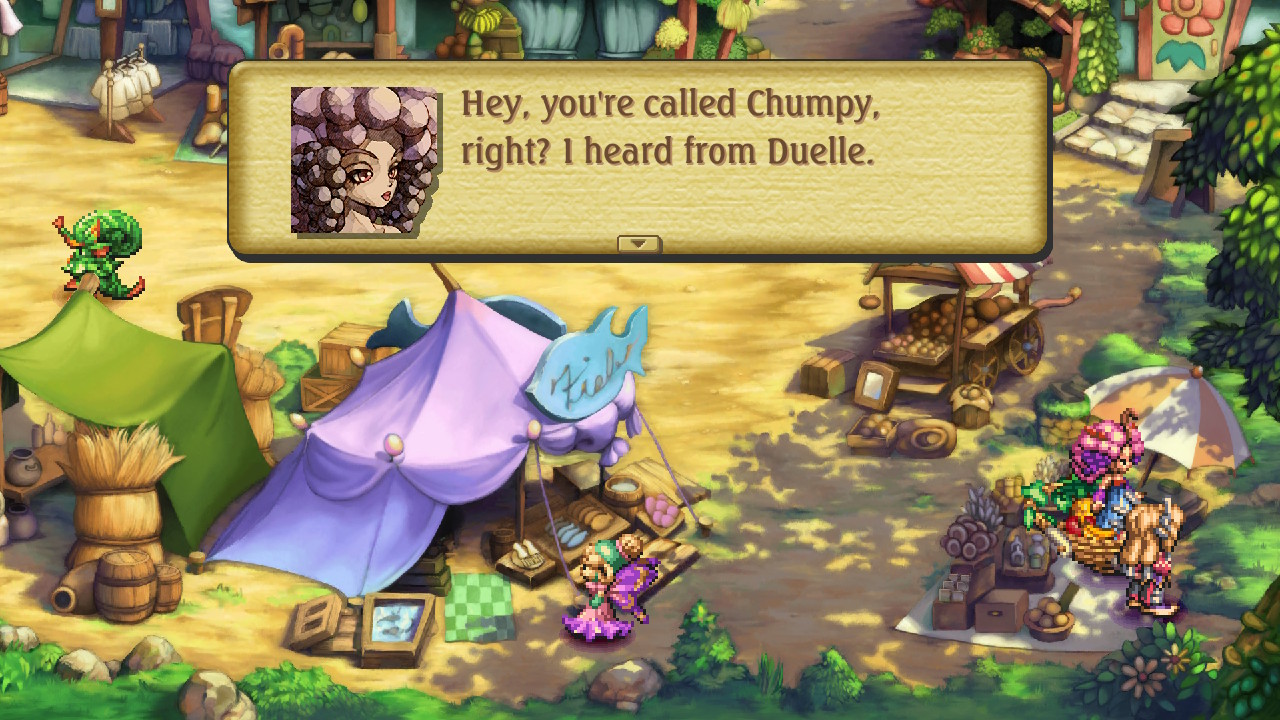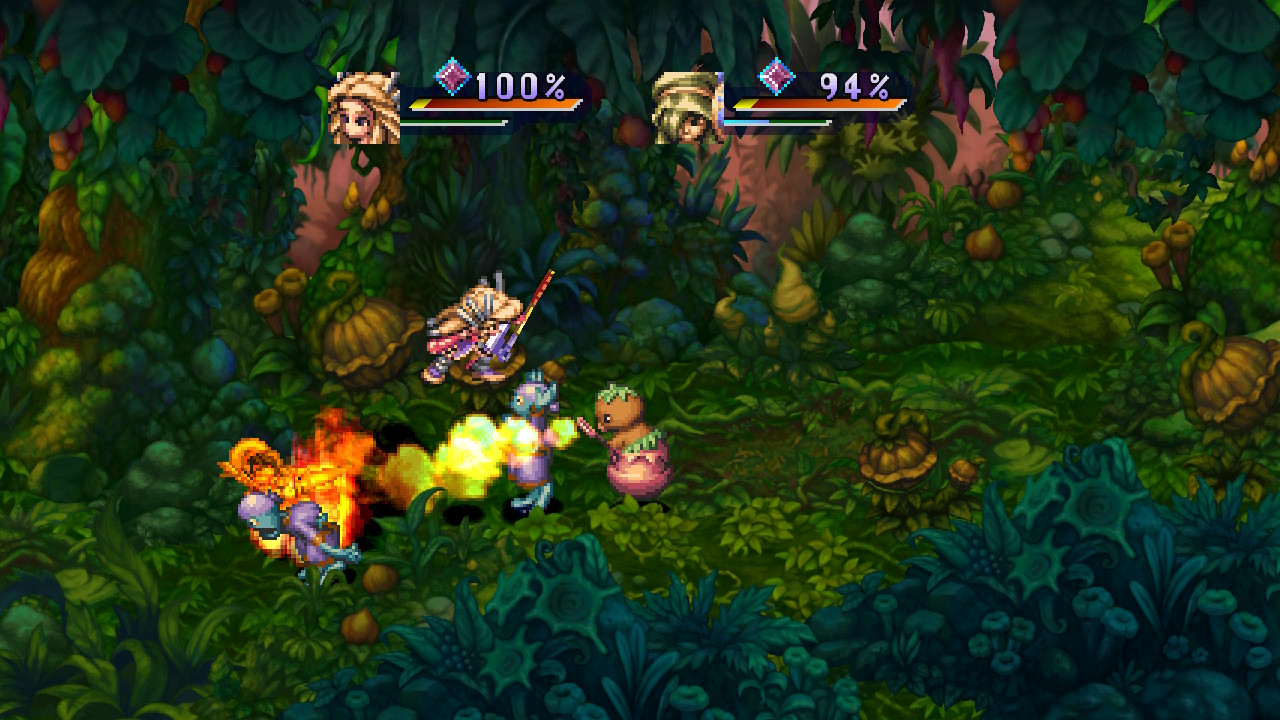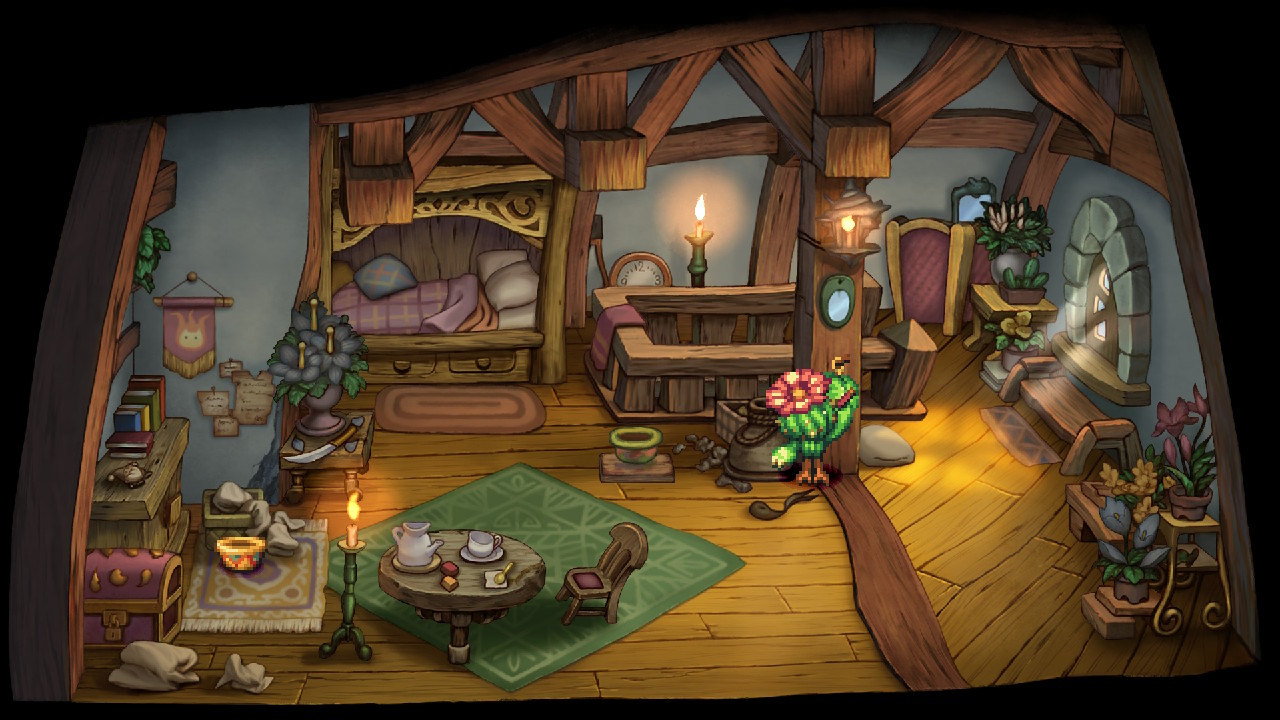See the video version of this review at the end of this page!
Legend of Mana is one of those stand-out games that scores all across the board. Initially released for the Sony PlayStation in 1999, it heralded the leap of the Mana series onto new technology. With that leap, it attempted to push boundaries as Seiken Densetsu 3 did on the Super Famicom. It arguably tried too much, making it quite ahead of its time with its myriad gameplay systems, and was a massive departure for the series, especially for Western audiences. But its eye-catching presentation, stellar soundtrack, and heaps of charm from the whimsical cast did a lot to smooth over the rougher edges for some players. With the 2021 release of the remastered Legend of Mana, we now see the game in a new light, ready for a new audience who could appreciate the forward-thinking elements of the title. Or, it could remain just as divisive.
Square Enix wisely chose to do little in the way of altering Legend of Mana from its framework. Instead, it’s a fairly direct port that polishes it for the latest gaming generation. The title screen doesn’t even mention the word “remaster” anywhere on it. The first actual sign of any changes comes from the remastered introduction video, shown at E3 2021, which seems like a taste of the promised anime. From start to finish, the updates to Legend of Mana are so subtle and unintrusive that you’ll hardly know it’s a remaster at all.
For those who have never explored the original, Legend of Mana is a vastly different game from its predecessors. The story structure is like no other in the series, broken up into scenes or interludes based on who the hero speaks with, what events they’ve completed, and certain other factors you figure out as you play. Many of the stories are simple one-shot little excursions that never lead to anything more significant but provide a fun bit of whimsy, build out the world, or send you into a deep state of mental reflection. Because tonally, Legend of Mana wends all over the place. You can help a shifty rabbit-man swindle his friends, watch pirate penguins fall in love, or talk to broken toys infused with the tortured souls of warriors reliving their trauma.
But it’s not all “side quests” per se. Players can pursue three major plot threads, full of drama and emotional commentary, culminating in “completion” of the game. Like the now-titled Trials of Mana before it, Legend of Mana encourages multiple playthroughs so players can make different choices and experiment with the world-building mechanics to see other story elements play out. However, many didn’t know this in 1999 since Seiken Densetsu 3 never made it here until 2019, which likely confused returning fans of the series.

However, what genuinely makes the stories in Legend of Mana shine are the characters. Despite being the “hero,” you’re an observer in the tale, serving as a catalyst for everyone else’s adventures. Each member of the unique, quirky, and delightful ensemble allows the heart of the tale to come alive while you play your small role in its unfolding. They are all so interesting and likable that you can’t help but want to learn more about each of them. Regardless, some may dislike the game’s piecemeal, hard-to-follow vignettes due to their fractured nature and dichotomous tone that doesn’t center on the “hero.” Still, the dialogue is relatively well-written, bolstered somewhat by minor updates to the localization, hitting its eclectic range of emotions effectively.
The mentioned world-building mechanic is the crux of the gameplay, allowing you to recreate the world of Fa’Diel with your imagination as you earn Artifacts, objects containing the sealed memories of the world, from quests. Tied to the world-building is a complex Mana system that applies elemental spirit levels to each location. Mastering placement is a convoluted trial and error system, but Mana levels influence certain events, open unique pet egg encounters, and the quality of item drops. Though tricky, the mechanic does encourage players to return and rebuild Fa’Diel anew again and again, and, over 20 years later, guides on the subject are plentiful.

Legend of Mana’s exciting, technical combat system remains intact and is likely the most familiar mechanic relating to its predecessors. The system seemed involved for a 2D action RPG of the day and can either be incredibly fun or frustrating. It gives players a lot of flexibility, with different attack types, various skills to learn, and flashy, visceral skill techniques that unlock depending on the weapon you wield. The subtle playstyle shifts between the weapons and a more tactical magic system keep the game fresh throughout the many encounters. What likely disappointed Western players coming from Secret of Mana to this PlayStation follow-up is the absence of 3-player gameplay. That hasn’t changed with the remaster, as you can still only invite one friend along to play when a guest NPC joins your party. And while toggling manual control for player 2 was a cumbersome affair in ’99, the remaster thankfully allows you to swap between manual and auto control for NPCs at will, making the co-op experience a lot more fun. Also, though it isn’t available on consoles, owners of the Steam version can even play with friends online.
Although the co-op option of combat is streamlined, how the game handles remains the same, for better or worse. The entire combat system can feel sluggish, hampered further by the simultaneously crisp and responsive yet slow and imprecise controls. Despite how painfully easy combat is throughout most of the game, its dated AI, inaccurate 2D hit detection, and erratic enemy movements can draw encounters out longer than necessary. Making matters more tiring is that poor AI programming extends to your NPC party members, pets, and golems. To be fair, NPCs can acquit themselves well enough, but the monsters you rear or construct do not prove much help at all. Without heavy investment in the complex systems that govern monster stats and personalities, you’ll mostly enjoy them as fun mascots for your adventure.
Outside of combat, movement can be annoying, especially in the cluttered environments in the various towns. You can toggle between walking and running, but the former is a touch too slow most of the time, though the latter will have your hero bruising their shins as they run into and get stuck on everything. Furthermore, when playing on Switch, I wanted the more ergonomic d-pad experience of a PlayStation controller. The analog stick isn’t quite precise enough when roaming about the environments, though it is worth sacrificing that comfort for portability. However, that may not be ubiquitous.

Arguably the most frustrating part of Legend of Mana is the repetitive nature of its quest design. The loose nature of the story necessitates a lot of retreading old ground, searching for the right person to trigger the next step, running into the same enemies that do not scale as you level. While this can still frustrate in the remaster, the gracious inclusion of toggling non-mandatory encounters off and on is arguably the best new quality of life update. It mitigates much of the tedium previously experienced when returning to early dungeons, allowing you to get to the heart of a story with greater ease.
Though it’s not the most exciting addition, Western players now have access to RingRing Land, a cute adaptation of a board game previously exclusive to Japan on the PocketStation. It’s a very basic minigame that you can get through quickly, depending on how many laps of the course you select or how long your pet survives combat encounters. Honestly, it would serve better as a mobile device app add-on instead of something you specifically boot your gaming system to play. Because of that, your mileage may vary, but it is arguably one of the more rewarding ways to level up your creature pals and earn valuable crafting materials.
Now, the overall presentation of Legend of Mana in 1999 was breathtaking and, honestly, has aged considerably well. I remember trying to show anyone with eyeballs that would listen how beautiful and exciting every bit of the game’s design was. It has an inventive, cartoonish whimsy scarcely seen at the time. Instead of using the PlayStation to take the Mana series into 3D, they used the additional power and space to create gorgeous pixel designs and stunning pre-rendered, painting-like environments and monsters. The remaster improves upon the wonderfully drawn backdrops, bringing them to life in a subtle but necessary way for new audiences. Enemies look equally refreshed, especially when battling the massive beasts faced in boss battles. Unfortunately, this leads to the opposite problem experienced in recent Final Fantasy remasters, with sprites sticking out a bit due to their jagged edges despite pixel-perfect updates for new aspect ratios. But their character portraits do look lovely, if a bit too sharp, and the cleaner text is easy to read. Importantly, Square Enix also addressed some of the more culturally insensitive and dated character designs, updating them for today’s standards, which is a very respectful and welcome change.

Musically, the team somehow improved upon Yoko Shimomura’s already memorable and timeless soundtrack. The composer returned to oversee the direction and arrangement of her original compositions, which shows in every piece. While you can toggle between the remastered and original soundtracks, it serves listeners to experience this refreshed take on the album. The integrity of the music is maintained, but modern instrumentation and arranging invigorate them, bafflingly elevating the masterful soundtrack even further. “Traveler’s Road” is even more dramatic, “Lumina, City of Moonlight” more mystical, all from seemingly minor adjustments and additions to the instrumentation. Though the original holds up incredibly, the remaster breathes even more magic into this fantastical world.
The subtle, though tangible tweaks to Legend of Mana’s presentation, coupled with maintaining its core gameplay elements, flaws and all, has achieved something quite brilliant. Playing this game feels exactly as I remember it. It looks the same, plays the same, and reads the same, even though I am acutely aware that it isn’t. There is no question that players would welcome a gameplay experience more refined by better system upgrades to explore this wondrous world, but Legend of Mana remains enjoyable despite this. If you’re patient with the murky controls, can get lost in the mystifying crafting and pet-rearing systems, and embrace the enchanting world and cast, Legend of Mana will leave a lasting impression from a game that plays like little else.


